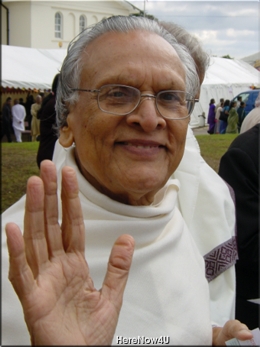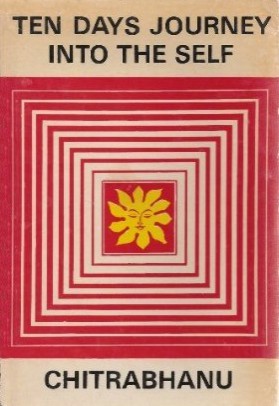At this point in history when we can fly around the world in the time it used to take to go from village to village, when there is instantaneous worldwide and even interplanetary visible and audible communication, and when through the eyes of the astronauts we have witnessed the splendor of the "earthrise", we are truly living in a global community. In India, Europe, Africa, and the United States, Gurudev Chitrabhanu has been teaching residents of our global community the principles of living, especially reverence for life.
A recent article in the New York Times about Gurudev Chitrabhanu compared his role in Jainism as that of Pope John's in Catholicism, calling him an "iconoclast" who has broken those conventional images which stand for divisiveness and confinement. "Social conventions were created in the perspectives of a certain time and some are no longer applicable," Gurudev was quoted as saying The law of life is change Man must change with the times or perish. Unfortunately people do not have the courage to confront outdated theologies, customs, and institutions. Out of a false sense of security, they reject change.
If a new religion were to suddenly burst forth near the end of the twentieth century, it might well resemble Jainism, the oldest of the world's great religions. Certainly it would have to be built on four of the main teachings of Jainism, as they are presented by Gurudev. In the nuclear age, when mankind has the power to destroy life on earth, it is imperative we live the Jain principle of Ahimsa, non- violence toward all living beings. Also, science has validated the Jain concept of Relativity, which Gurudev explains as meaning that all truths are aspects of the whole, with new aspects always being discovered. Relativity implies also that we should listen open-mindedly to one another. Third, Jina means "conqueror: the Jina is one who has conquered his are inner enemies, which is what psychiatry is all about. As Toynbee has pointed out, in Greece and India twenty-five hundred years ago, there were philosophies that contained clear foresight of modern psychology and psychiatry- This self-knowledge is popularly recognized as essential today, since as the Pogo cartoon says, "We have seen the enemy and it is us.''
And also, now when we are suddenly confronted with air and water pollution, and an energy crisis as one symptom of our waste of resources through over consumption, and all the computerized dangers calling for limits to growth, the time has come for Commitment to the Jain principle of Aparigraha, or non-acquisition, and restricted consumption.
While we probably cannot expect the bursting forth of a new religion, what is already happening is that the old thought barriers separating the great religions are breaking down, and a global perspective is emerging. Father Thomas Berry, who is founder of the Riverdale Center for Religious Research, points out that while we all may achieve our own growth from being rooted in our own traditions, we are also entitled to the global heritage of all religions. And global religion does not mean a mishmash, but a rich mosaic in which each religion can gain by its being complementary to the others.
Gurudev's emphasis on the Divinity in man is a salutary aspect of its rich heritage, especially now when our morale is at low ebb. just when we need all the courage and confidence we can muster in order to get rid of war and build world unity, and also to restructure our society so that two-thirds of us will not be living in subhuman conditions, some popular schools of psychology psychiatry are presenting a negative image of man, as the aggressive animal, or as an object to be controlled. Also modern politics and advertising have been reducing
truth to credibility, and personal gain too often takes priority over ethical concern for others. Therefore Gurudev's emphasis on the divine within us, to be nourished by meditation, is most timely. (Quakers also believe in 'that of God in every man," the "inner light." the more rays of religious insight that converge, the better!)
Gurudev Chitrabhanu started life in a small village in India, and the glow in his own heart more than any thing else guided him to that journey which all seekers take, in search of meaning of life. This journey entails a study of the wisdom that others in the past have found and recorded in their words and their examples; and also it entails contact with living persons who live in ways transcending the mundane. Yet the most important thing for the seeker is what he does with what he finds. Gurudev has done so much with what he has found that he conveys truth dynamically, as much by examples as by words. Guru Chitrabhanu demonstrates the transforming power of Beingness and presence so fully that he illustrates the promise of, and the way toward, a new humanity.
As is often pointed out, the West has concentrated largely on the exterior world, the physical world, in which it has gained great power through science, while the East has tended to concentrate on the interior world. Gurudev Chitrabhanu blends awareness of the exterior with the interior so that he is a whole human beings, leading a whole and balanced life. And to be whole is to be holy! Rather than regarding the phenomenal world as ephemeral, a cycle of unending and painful change, Gurudev like Mahatma Gandhi, regards it as man's responsibility and challenge. for him it is a source of joy! His being whole has a tremendous magnetic and compelling power, inspiring all those who come into contact with him to move toward their own wholeness.
While alienation is the term often used to describe the condition of man, past and present, Gurudev radiates atonement. He is attuned to the world of nature: sun and trees and seas and seasons, and all plants and living beings. He is attuned to all that mankind, through its positive potential, has added to the earth by way of civilization: religion, art, music, philosophy, technology. He is attuned to his wife and his sons. He is attuned to all people, because he relates to their positive potential.
The crisis of modern life takes a practical and pragmatic focus: to meet it we need the hope, vision, reverence for life, the sense of joy and awareness of being a vital part of the cosmic forces, that non- divisive, non-sectarian religion offers. In order to feel at home in these tremendous times we need the state of consciousness in which we experience harmony with ourselves and the universe. We need to live a life harmonizing action and contemplation. Gurudev Chitrabhanu comes to us as an exemplar and an enabler of that harmony. In the words with which St. John of the Cross so simply expressed his elation, "Oh happy chance....oh happy chance."
A phrase that has caught hold ever since the moon landing has been that sometime we will "put the first man on earth." Many feel that this "first man on earth", who will herald a new age will be much like Gurudev Chitrabhanu.
 Gurudev Chitrabhanu
Gurudev Chitrabhanu
